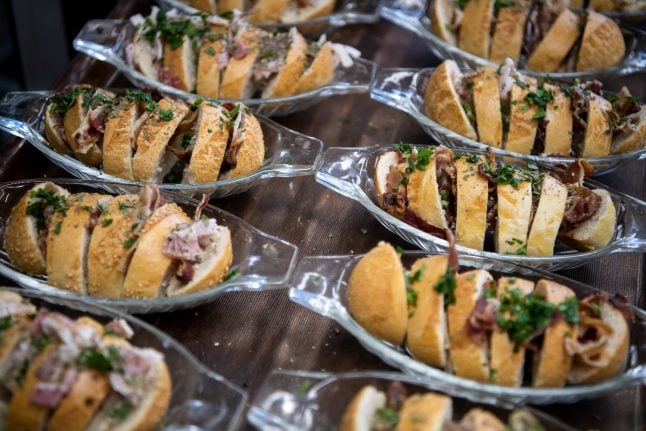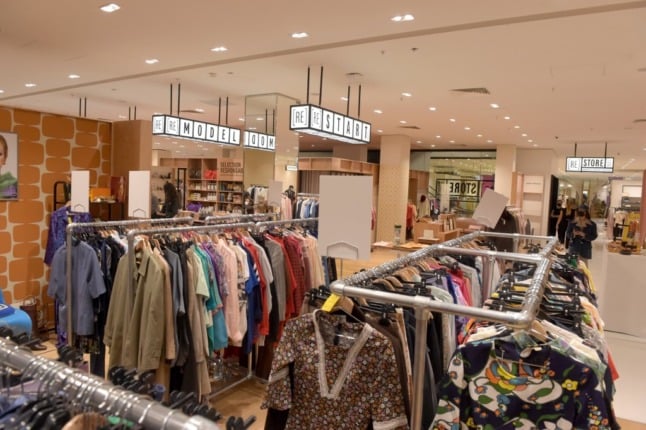At first glance, the four-course meal could be on any menu: three types of bruschetta fish soup to start, schnitzel and roulade for a main dish, and sorbet or pudding for dessert.
But what the head chef of the Bremerhaven Atlantic Hotel Sail City, Dominik Flettner, serves this evening is not standard for a restaurant. The dishes tonight are prepared from leftovers made for the hotel's breakfast or lunch buffets.
READ ALSO: Germans waste 55 kg per person of food per year
The remaining food is not on a fixed menu, but can be ordered as a group meal. Since 2017, the four-star hotel in northern Germany has also been inviting selected guests once a year to serve the leftovers banquet-style.
“We deliberately chose the term 'leftovers' to polarize and stimulate a dialogue about food waste,” said hotel director Tim Oberdieck. “The question is: what is waste anyway?”
 Head Chef Dominik Flettner works in the kitchen of the Sail City Hotel. Photo: DPA
Head Chef Dominik Flettner works in the kitchen of the Sail City Hotel. Photo: DPA
Nothing goes to waste
The restaurant still follows strict hygiene regulations, not using the food already set out for guest earlier. “We can use everything that hasn't left the kitchen,” explains Flettner.
Carrot or potato peels are a prime example. Washed beforehand, the kitchen then fries them into chips. According to Flettner, “It's delicious as a crunch on a salad.”
The same goes for tomatoes: “With Caprese salad, guests only take slices from the center of the tomato. That is why we cut the edge pieces and make bruschetta out of them.” Sliced bread rolls, which were not needed for the breakfast buffet, serve as a crisp base.
The entire fish is used to create the soup, not just fillets. The roulades are made from water buffalo meat from animals that live in a pasture only kilometres from the hotel. The entire animal is utilised for a variety of dishes as well, such as bread dumplings – again made from old breakfast rolls.
READ ALSO: Germany wastes 1.7 million tonnes of bread a year
The main ingredient for the menu's cabinet pudding, a sweet molded English dish, is unused croissants.
“The word leftovers has a negative connotation,” said the managing director of the United Against Waste association, Torsten von Borstel, who advises institutions on how to save waste from food.
He said food scraps don't necessarily mean inferior quality. His organization checked the kitchens of two dozen hotels in 2017 and, on average, 27 percent of food was thrown away after each meal.
“There is simply too much production,” said von Borstel.
 Head Chef Dominik Flettner shows the transparent waste bins used in the Sail City Hotel. Photo: DPA
Head Chef Dominik Flettner shows the transparent waste bins used in the Sail City Hotel. Photo: DPA
Mission: No food left behind
Overly-generous breakfast buffets are largely responsible for the waste quantities. Guests also leave a lot on their plates. Hotels could make simple fixes “that don't mean giving up diverse dishes.”
According to calculations by the Braunschweig Thünen Institute, most food waste is generated in private households. Von Borstel said consumer behavior is difficult to change: “The greatest potential for avoiding waste lies in food service outside the home.”
In various studies, experts assume that around two tons of food are thrown away every year – too much, said Borstel. “We have over 40,000 hotels in Germany, so we have by no means reached everyone with our initiative,” he said.
The head chef from Bremerhaven knows what Borstel is talking about: “I used to work in kitchens where nobody thought about that. They threw everything away,” said Dominik Flettner.
Food and money saved
At the breakfast buffet in the Bremerhaven Sail City Hotel, smaller rolls, sausage slices and platters are offered. Even the spoon size in the bowls has been reduced. “We also work with psychology,” said Flettner. Put less on your plate, but eat everything on it.
Shortly before breakfast ends, empty plates are no longer refilled, and second helpings are brought directly guests on request. Transparent waste bins have also been set up in the kitchen to raise awareness among the kitchen team of what ends up in the garbage.
“It has a big effect,” Flettner said. In the breakfast area, more than 32 percent of the food spent was saved. “You can't do much more,” said hotel director Oberdieck. He spends up to €15,000 less on purchases every year.
There are also leftovers from the annual leftovers: Above all, the fillings bread dumplings remain on the plates. Nevertheless, after weighing the food waste at the end, Flettner is satisfied: “87 grams of waste per person. That's a top figure.”



 Please whitelist us to continue reading.
Please whitelist us to continue reading.
Member comments